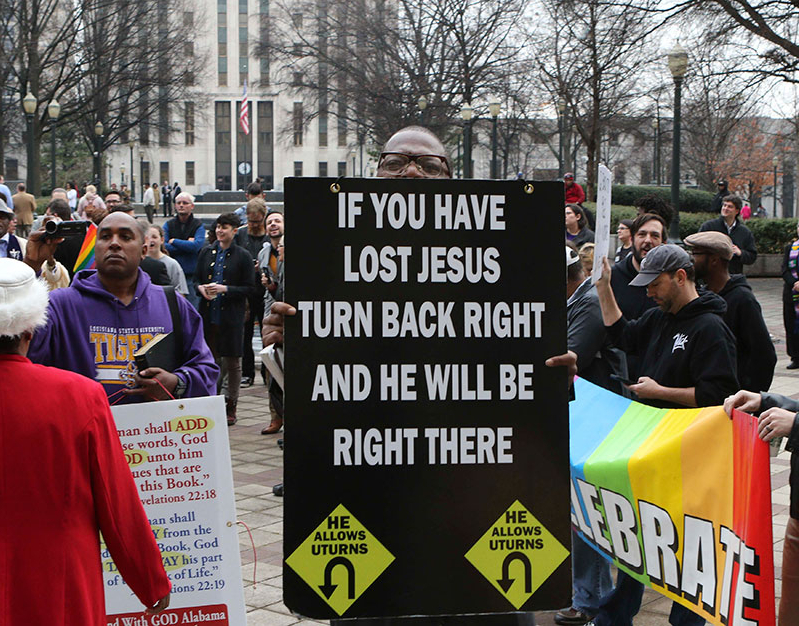
Thanks to changing demographics and various rulings from the Supreme Court, some Americans feel that the United States has entered a "post-Christian era." Two columnists look at the impact of this trend and how Christians in the United States can live within this new reality.
David Davenport of Forbes claimed in an editorial that the U.S. "has turned sharply in a secular direction" thanks to policies enacted by "elites and handed-down dictates from courts." He contended that such decisions would leave a long-term aspect in various aspects of American culture.
"America has never been a theocracy, following the direct rule of God in the manner of the Islamic Republic of Iran or the Vatican (or Israel in Old Testament times)," Davenport wrote. "Rather, America has been referred to as a Christian nation because of the core beliefs and world view of a majority of its people and an acknowledgement of God by its public leaders and symbols."
Davenport looked at poll data and surveys gathered from the Pew Foundation and Public Religion Research. He found that while older Americans have generally embraced Christianity, many young Americans, particularly those between ages 18 and 33, are increasingly secular.
"These numbers are changing remarkably quickly as Americans are seemingly losing their faith and becoming more like secular Europeans," Davenport wrote.
Davenport also highlighted that the impact of "traditional Christian teaching on social mores" has been declining in the United States in favor of "a new and more liberal orthodoxy."
"The sexual revolution continues to redefine the nature of sex, relationships and the family away from orthodox Christian teaching," Davenport wrote. "Young people increasingly see science as a challenge to the teachings of the Bible. The rise of tolerance as the ultimate value in society sometimes clashes with religious notions of absolute truth."
Davenport cited recent court cases both at state and federal levels where "religious influence and symbolism in the public square" have been attacked.
"When the Oklahoma Supreme Court votes 7-2 that a monument of the Ten Commandments must be removed from the state Capitol, as it did recently, you know times are changing," Davenport wrote. "It probably will not be long before 'one nation under God' in the pledge and 'in God we trust' on the currency will be ruled unconstitutional by courts."
According to Davenport, the traditional Christian understanding of marriage was not considered much in the Obergefell v. Hodges decision, which legalized same-sex marriage in the entire U.S.
"The justices could only uphold Christians 'teaching' and 'advocating' their views, rather than quoting the more muscular language of the First Amendment about 'free exercise,'" Davenport wrote. "In his dissenting opinion, Justice Samuel Alito warned that the court's opinion 'will be used to vilify Americans who are unwilling to assent to the new orthodoxy.'"
Davenport pointed out that Christians have "survived governments and societies of all kinds throughout the ages." However, he expressed uneasiness about the future of larger American society.
"The Founders consistently warned that in order for a free republic to work, a virtuous people would be needed, and the source of that virtue, in their experience, was religion," Davenport wrote. "So the question we must answer in post-Christian America is this: What will be the sources of our virtues and values?"
Washington Pastor Don Green of the First Christian Church in Ellensburg wrote a column in Daily Record on how American Christians can live within a post-Christian culture. He contended that the church is negatively affected when there is a high degree of political polarization.
"As Christians in a post-Christian culture, we must find a way to stand for objective truth and at the same time relate and communicate with people in a loving way," Green wrote. "When the church becomes polarized, it becomes paralyzed."
Green pointed out that much of the polarization problem in American society has been due to the "false dichotomy" of deciding between "two supposedly opposite choices."
"One group draws a conclusion and claims that it is one of only two options, and the other option is clearly and demonstrably wrong. You must be either on one side or the other; it's an either/or choice," Green wrote. "If you don't agree with the position of a particular group, then you must hate them. Or, from the other perspective, if you don't hate them, you must support them."
The pastor urged Christians to build bridges instead of "driving wedges."
"If we don't handle carefully the way we speak to those with whom we disagree, we won't be taken seriously," Green wrote. "Instead, we will find ourselves marginalized and ignored."
Green emphasized that Christians should "cling to the truth even when parts of it appear at opposing extremes." At the same time, however, they should embrace the "AND" as exhibited by the character of Jesus.
"Can we stand for traditional Biblical marriage AND love people who identify as homosexual? Can we recognize differences in race, age, gender, ethnicity, and social and economic class, AND refrain from discriminating against others?" Green wrote. "Can we uphold the dignity of human life AND exhibit compassion for those experiencing painful behavioral consequences? Can we practice fiscal responsibility AND provide a hand-up to those who have been knocked-down? The answer is a resounding yes."
Green reminded Christians that "our message is the good news that God has provided a way back to Him through Jesus Christ."
"Sin is still sin, but the person still bound up in it is not our enemy but the victim of our enemy, Satan," Green wrote. "Sin is still sin, but as we share the gospel message we must do so by expressing hope over judgment. Sin is still sin, but we must be able to take a stand with open, warm hearts, not clenched fists and square jaws."






